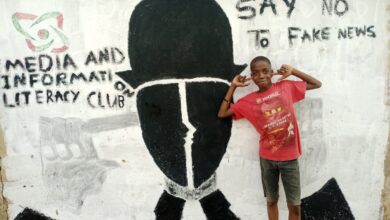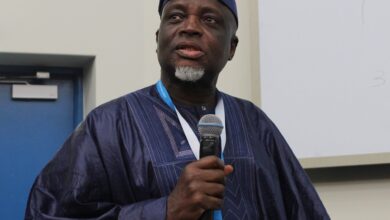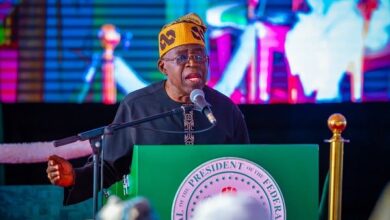Influence Operations: A Cankerworm on Information Cycle and Consumption

BY: Mustapha Lawal
Beliefs are considered sacred, so many people hold whatever they choose to believe dearly. It is thought that individuals can go to any length to defend what they believe in until it is proven to them beyond reasonable doubt otherwise.
Neuroscience studies demonstrated that beliefs are the neuropsychic byproduct of basic brain functions that give affective meaning to tangible objects and events, allowing for setting personal objectives, making decisions, and navigating the environment.
According to The Bureau of Investigative Journalism, two of the most common tactics to manipulate people’s belief systems are “misinformation” and “influence operations”. Misinformation means the creation and spread of false or misleading information, either accidentally or deliberately (disinformation or misinformation), and influence operations are purposeful projects that skew how people see the world. The two tactics are often linked.
Influence operations are a form of psychological warfare aimed at influencing a target group’s perceptions, beliefs, and behaviours in favour of the originator’s objectives. Since prehistoric times, misinformation and influence operations have been recognized as an important method of weakening/strengthening belief systems.
Traces of influence operations can be found in all walks of life and every fabric of our society. It is however most predominant in sentimental matters of public interest; elections, democracy, governance, societal values, myths and facts and even religion.
The problem of misinformation extends beyond false claims made by particular sources. In recent years, dubious actors have increasingly used digital platforms to spread various techniques and organised campaigns that include not only misleading material but also true distorted narratives.
These are often referred to as “influence operations,” which include the dissemination of misinformation and false narratives via covert influencers or prominent figures, but they can also entail the creation of controversy around truths.
Democracy worldwide is under threat from attempts to manipulate views on the internet. A growing pool of paid professionals, state-backed agents and ideologically driven amateurs are targeting our digital spaces.
They have access to increasingly powerful tools and the run of poorly protected platforms. The examples of misinformation and manipulation have kept coming. For one, we saw how dangerous misinformation about vaccines spread widely during the pandemic.
Another is the Indigenous People of Biafra (IPOB), a separatist movement aiming to establish the Republic of Biafra, and has gained notoriety for spreading disinformation and hate speech, particularly on social media platforms. According to a Humangle report published by Kunle Adebajo, “the disinformation network relies on scores of pages and groups on Facebook, several news blogs, and thousands of amplifiers across social media networks.” Some of the notorious disinformation campaigns the group has pushed include: the alleged death of Nigeria’s President Muhammadu Buhari or that he was cloned, claims about the massacre and persecution of Igbos and Christians, and that the movement has advanced firepower.
What is Influence Operations?
According to Philstar.com, Influence operations refer to orchestrated efforts by various actors (public, private groups or foreign interests), driven by financial, political, cultural, ideological, or policy interests and often aim to disrupt the flow of accurate information, targeting important aspects of democratic values, social well-being, safety and peace.
Influence operations often involve the use of propaganda, disinformation, psychological manipulation, and deception. Influence operations can take the form of spreading misinformation, but could, for example, also mean boosting something true but relatively minor to take a disproportionate size in online conversations.
It covers a wide range of activities designed to manipulate public opinion and shape narratives. They are conducted through various channels, including traditional media, social media, and covert channels. According to a research report by Baris Kirdemir (2019), target audiences can be governments, organizations, groups, and individuals.
Influence operations can have measurable effects on people’s beliefs and behaviour, but empirical research does not yet adequately answer the most pressing questions.
Empirical studies show influence operations through long-term exposure via traditional media and short-term exposure via social media can cause a shift in belief and affect behaviour, leading to increased political violence in conflict or unrest settings and causing shifts in political beliefs, increased xenophobia, and scepticism about vaccines.
Instances of Influence Operations:
In January 2024, Nurudeen Akewushola reported for the International Center for Investigative Reporting (ICIR) how foreign-linked accounts amplified disinformation about gunmen attacks in Plateau state, Nigeria.
According to the report, various social media accounts used unrelated images and videos to depict the attacks in a seemingly coordinated manner. Those managing these accounts frequently link the incident either to the persecution of Christians, attribute the attacks to Islamic groups, or connect them with religious violence even when they are not related and the administrators of these accounts are found to be from foreign countries such as United States, Israel, Australia and Italy.
The Foundation for Investigative Journalism (FIJ) published a feature report in February 2024 that confirmed how the incumbent Nigeria Minister of Interior, Tunji Ojo’s image is being laundered. “No fewer than 50 accounts operated by influencers have been engaged to promote Olubunmi Tunji-Ojo, Nigeria’s Minister of Interior, on social media” FIJ reports. The mode of operation employed by these influencers follows established patterns of coordinated social media campaigns, FIJ reveals.
Instead of genuine and spontaneous engagement, the influencers craft their content around the subject, quoting the minister’s statements and using specific hashtags to increase visibility and monitor effectiveness. This manipulation of online discourse distorts public perception and creates a false sense of popularity and support for the minister, ultimately undermining the integrity of public discourse and democratic processes.
A Premium Times investigation found a network of X (Twitter) accounts that carried out what appears to be a coordinated influence operation for Erisco Foods Limited and violated the social media platform’s policies in the process. The investigation uncovers a coordinated effort on Twitter to boost the reputation of Erisco Foods, a Nigerian food manufacturer. More than a dozen Twitter accounts, many of them parody accounts of influential personalities, participated in this campaign on January 19th.
The campaign aimed to sway public opinion in favour of Erisco Foods, particularly regarding their treatment of a customer who criticized their product online. This reflects an attempt at influence operation, where organized efforts shape perceptions or behaviour, often by spreading misleading information. While there’s no report of direct evidence linking Erisco Foods to this campaign, critics suspect their involvement.
“…Influencers are part of the problems we face in our society today”
Public relations, mainstream (traditional), digital and the political media can influence public opinion. Social media have a significant impact on the evolution of public discussions and public opinion.
Social media has revolutionized the way people communicate, share information, and engage with one another. Its impact on various aspects of society, including politics, cannot be overstated. In recent years, social media platforms have become powerful tools for shaping public opinion and influencing elections.
“Platforms that were originally designed for entertainment are nowadays one of the main gateways to information sources and the principal environment in which public opinions get shaped.”
– Cinelli et al., (2022), Coordinated inauthentic behaviour and information spreading on Twitter.
The role of influencers in shaping public opinion has become prevalent in recent times with public figures, politicians, and even businesses conducting coordinated campaigns to sway public opinions in their favour. Influence operations, especially those orchestrated by social media influencers, play a significant role in shaping public opinion and discourse in today’s society.
Influencers can sway public perception on important issues as evidenced by the coordinated campaign to rehabilitate the image of Betta Edu, suspended Minister of Humanitarian Affairs and Poverty Alleviation. This manipulation of information can have far-reaching consequences, as it can distort the truth and hinder efforts to hold individuals and institutions accountable for their actions. More than fifty X accounts were found pushing a disinformation campaign to launder the image of the suspended Nigerian minister of Humanitarian Affairs and Poverty Alleviation, Betta Edu, a social media investigation by The FactCheckHub revealed.
Moreover, the involvement of influencers in such operations exacerbates existing societal problems, particularly those related to corruption and lack of transparency. In the case of the campaign for Edu’s reinstatement, the sudden change in stance from supporting her suspension to advocating for her return raises questions about the integrity and independence of influencers. This opportunistic behaviour not only undermines public trust but also perpetuates a culture of impunity among those in positions of power.
The financial motivations behind these influence operations reveal a deeper issue of corruption and exploitation within the influencer ecosystem. Many influencers engage in amplifying information, not out of ideological reasons but for pecuniary gains, often using false identities or multiple accounts for promotional purposes.
According to the FIJ report, “An analysis of many of the accounts employed in the Interior Minister’s campaign shows them to be supporters of the ruling party predating Tunji-Ojo’s ministerial appointment.”
In a situation where there is evidence to show that participants have been paid, the perceived beneficiary may be completely unaware of such campaign as it may have been sponsored by associates or aides hoping to curry his favour.” Ajayi, a researcher who has experience exploring the weaponisation of social media in Nigeria told FIJ in the report.
How to Spot Influence Operation
Influence operations, just like misinformation can be difficult to spot as they are often designed to be hidden. One way to identify influence operations is by analyzing the timing and semantics of social media posts. In the case of Olubunmi Tunji-Ojo, Nigeria’s Minister of Interior, coordinated influencers posted content that closely followed the minister’s statements, often using specific hashtags and keywords to increase visibility. This pattern suggests a concerted effort to shape public perception rather than genuine engagement.
Another red flag to look out for is the behaviour of the accounts involved in the influence operation. Accounts that suddenly emerge or significantly increase their activity around a specific topic or individual, especially without a prior digital footprint, are likely part of a coordinated campaign. For instance, in the case of Tunji-Ojo, many influencers promoting the minister had no previous online presence until the scandal involving him came to light. This sudden surge in activity indicates a coordinated effort rather than organic engagement.
Also, the consistency in messaging and the repetition of certain keywords or phrases across multiple posts are signs of an influence operation. In the case analyzed, influencers consistently used specific hashtags like #RenewedHope and #NewDawnWithBTO to associate positive sentiments with the minister.
Difference between Influence Operations and Troll
Troll, according to the Cambridge Dictionary, refers to leaving an intentionally annoying or offensive message on the internet, to upset someone to get attention or cause trouble. While trolls may behave similarly to those in influence operations, they’re not the same. Trolls may harass, spread disinformation, or provoke conflict online. However, influence operations involve more organized efforts with specific motives, aiming to disrupt information and institutions for broader objectives. Unlike trolls, influence operations have long-term goals, such as undermining democracy or manipulating public opinion. So, while troll-like behaviour can be part of influence operations, influence operations are more complex and have larger aims
Conclusion
FactCheckAfrica believes that the best defence against these threats of influence operations and misinformation is making sure the public knows about them since they can be difficult to identify and often designed to be hidden from view. The prevalence of influence operations underscores the need for greater awareness and critical thinking skills among the public. Individuals must be vigilant in questioning the motives behind online content and discerning between genuine information and propaganda.
This article written as part of FCA’s series on Countering Misinformation and Disinformation in Africa
Editor: Habeeb Adisa




